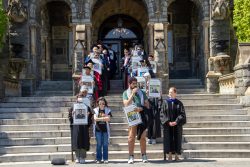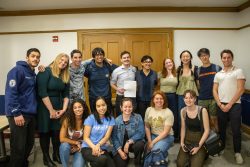Class of 2017 students will be able to receive housing points for attending a new series of speaker panels, presentations, and breakout activities organized by the Georgetown University Student Association. The What’s a Hoya program will reward students with 0.1 housing points for each event attended.
This year, the program will be divided into monthly themes for November, January, and February, finishing before housing selection commences in March. The themes in sequence will be “Women and Men for Others,” which will focus on mentorship, “Cura Personalis,” which will center on safety and well-being, and “Community in Diversity,” which will discuss pluralism in action.
Each month will have four sessions and students will only be allowed to attend one session per theme. Each session will vary by speakers but will cover the same general material. GUSA hopes to accommodate a total of 1800 possible students per theme, more than the total of just below 1600 students in the class of 2017.
“[The goal is] to build a base of common vocabulary and to have a rising tide that lifts all boats, where everyone will have at least exposure at some level to these concepts,” said Nate Tisa (SFS ’14), president of GUSA.
The idea for the program first came about over the summer and was organized with the University throughout this semester. GUSA hopes to see the program function as an expansion of New Student Orientation throughout the year for freshmen.
“Those first three days are a whirlwind, and you have a lot of things going on, so this is a few months in and reintroduces them to resources,” said Megan Murday (SFS ’15), one of the three What’s a Hoya coordinators.
GUSA hopes to incorporate other clubs into the sessions and direct students to these clubs and resources through the program.
“We see our role as the logistical component to bring people together to discuss these issues,” said Chandini Jha (COL ’16), another What’s a Hoya coordinator. “All the programming is already something that we have specialists in the administration and student clubs for, who have these things down-pat.”
What’s a Hoya will reach out to student groups to advertise relevant upcoming events. Student panels will be part of the sessions and students will be encouraged to nominate fellow students as panelists on the GUSA website.
GUSA hopes to incentivize freshmen to attend with the 0.1 housing point reward.
“It had to be an incentive that applied equally to everyone. Not everyone likes basketball games and gift certificates, and those things cost a lot of money when you talk about numbers of 1000, 1500 people,” Tisa said. “However, one thing that unites all freshmen is that they have to select sophomore housing.”
Higher selection points give students a better chance of having a lower selection number, and thus a better choice of housing. The 0.1 number is designed to prevent freshmen from having higher points than other classes.
No other group or activity has been able to utilize housing points before. Housing does not plan on extending this benefit to any other group.
“Due to the unique nature of this program, we felt it was important to be supportive and make this accommodation. I do not see other programs in the future that reach this scope and will have such a positive impact on the student body,” Patrick Killilee, executive director for residential services, wrote in an email to the Voice.
The first theme, mentorship, will discuss the importance of making connections and will include a panel with a dean and two professors, an alumni presentation, and a student panel. It will also feature Fr. Kevin O’Brien, S.J., vice president for mission and ministry, as introductory speaker for all four sessions.
“I was happy to accept GUSA’s invitation to offer introductory remarks,” O’Brien wrote in an email to the Voice.
January’s theme, safety and well-being, will discuss health and safety resources as well as guidelines for neighborhood relations. February’s topic, pluralism in action, will focus on diversity.
A sexual assault workshop for the January theme is still in discussion but may be part of programming.
“We need to make sure that what we do include is appropriate for the setting, which is large groups and public discussion,” Tisa said. “We need to work with the professionals to develop something that makes sense.”
Each session will be from one to one and a half hours. Attendance will be recorded and in order to get the incentive, attendees will be required to complete an assessment on HoyaLink afterwards. The assessment, which is still in the works, is designed to test what students learned, provide an opportunity for reflection, and serve as an exit survey.
Participation in What’s a Hoya is restricted to freshmen for its pilot year but may expand to other classes in coming semesters.
Students can sign up for the first topic on HoyaLink starting Nov. 11. The first month’s sessions are on Nov. 20, 24, 25, and Dec. 6.
Editor’s Note: A previous version of this article incorrectly stated that there is a total of 3397 students in the class of 2017.




